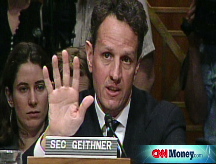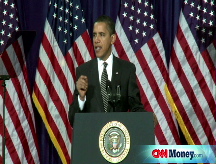Dow closes at 6-year low
Worries about the bank sector batter the Dow and S&P 500, while the Nasdaq manages to stabilize.
NEW YORK (CNNMoney.com) -- The Dow industrials ended at a fresh six-year low Friday, as worries about the outlook for the banking sector exacerbated fears of a prolonged recession.
Treasury bond prices rallied, lowering the corresponding yields, and gold prices flirted with record highs as investors sought safety in hard assets.
The Dow Jones industrial average (INDU) lost 100 points, or 1.3%, closing at the lowest point since Oct. 9, 2002, at the bottom of the last bear market.
Since peaking at 14,164.53 in November of 2007, the Dow has lost 48%, as the recession, housing market collapse and banking crisis have all pummeled investor confidence.
The S&P 500 (SPX) index lost 9 points, or 1.1%, ending at the lowest point since Nov. 20, 2008, seen by some as the low of the current bear market.
The Nasdaq composite (COMP) lost 1 point or 0.1%, erasing bigger losses. The session low was 1416.96, which is still above the Nasdaq's low from January of this year. The tech sector has performed better in 2009 than the rest of the market.
Stocks had tumbled through the early afternoon on worries about the economy and the future of the biggest banks, amid talk that the government might have to nationalize the hardest-hit companies.
But stocks managed to cut losses and the Nasdaq turned higher for a while after White House spokesman Robert Gibbs reiterated that the administration believes in a privately held banking system.
The comments from Gibbs seemed to give investors a reason to stop selling off the banks so much and to get back into the market, said Joseph Saluzzi, co-head of equity trading at Themis Trading.
"The Gibbs' conference gave them an inkling of hope that the government won't nationalize the banks and that brought people back in," Saluzzi said.
However, the confidence problem that has been plaguing the markets remains in place for the time being, Saluzzi said.
"Without confidence, no one wants to step up and buy," he said.
Stocks have been sliding over the last few weeks as investors have shown skepticism about the government's ability to slow the recession, despite the announcement of a series of programs, including a massive economic stimulus package. Skepticism about CEOs is also a factor. And worries remain that another Ponzi scheme could be brewing, along the lines of Bernie Madoff or Robert Allen Stanford.
"The stimulus plan got more attention, but fixing the banking system in a way that's durable is the primary overhang in the markets right now," said Lee Schultheis, chief investment strategist at AIP Mutual Funds.
Financials: Bank, housing, insurance and other financial stocks have led the retreat this year and continued to do so Friday.
Bank stocks were hit especially hard Friday on worries that the government may have to nationalize certain flailing banks, a move that would wipe out shareholder value. Senate Banking Committee Chairman Chris Dodd, D-Conn., said that such short-term takeovers may be necessary. However, the White House is not in favor of such a move.
Dow components Bank of America (BAC, Fortune 500) Citigroup (C, Fortune 500), American Express (AXP, Fortune 500) and JPMorgan Chase (JPM, Fortune 500) all tumbled through the afternoon. But all except Citigroup managed to cut losses by the close.
The selling in the bank sector has picked up in the last 10 days since Treasury announced a revamped bank bailout plan that critics say provides few essential details. In particular, the plan did not establish how to value the bad assets that are cluttering up bank balance sheets.
"Not only is a good solution required, but it has to happen quickly," Schultheis said. "Every day that goes by without action is adding to the deteriorating environment for corporate earnings, which is hurting stocks."
On Thursday, the Dow ended at the lowest point since Oct. 9, 2002, the low of the last bear market. The S&P ended the session at its lowest point since Nov. 20 of last year, when the panic around the financial crisis peaked.
Tech has performed better than the rest of the market and the Nasdaq stands almost 10% above its Nov. 20 close.
Over the last two weeks, the government has announced a number of programs meant to take the edge off the recession.
President Obama's $75 billion housing plan, announced Wednesday, is intended to help up to 9 million struggling borrowers. On Tuesday, Chrysler and GM asked for another $21.6 billion to stay afloat on top of the $17.4 billion in government assistance they have already received.
Investors are still sorting through the details of the $787 billion economic stimulus plan, signed into law Tuesday.
Company news: Lowe's (LOW, Fortune 500) reported weaker quarterly sales and earnings and issued a fiscal 2009 forecast that is short of analysts' expectations.
J.C. Penney (JCP, Fortune 500) reported higher-than-expected earnings but forecast a current-quarter loss that is bigger than what analysts are expecting.
General Motors (GM, Fortune 500) tumbled 11% on ongoing worries about its solvency, closing at a more than 70-year low, according to Dow Jones.
Market breadth was negative. On the New York Stock Exchange, losers beat winners by almost three to one on volume of 2.12 billion shares. On the Nasdaq, decliners topped advancers by over 2 to 1 on volume of 2.57 billion shares.
Economy: The Consumer Price Index rose 0.3% in January, as expected, after falling 0.8% in December. The so-called Core CPI, which strips out volatile food and energy costs, rose 0.2% versus forecasts for a rise of 0.1%. Core CPI was flat in December.
Other markets: Treasury prices rallied, lowering the yield on the benchmark 10-year note to 2.79% from 2.81% Thursday. Treasury prices and yields move in opposite directions.
In currency trading, the dollar gained versus the euro and the yen.
U.S. light crude oil for March delivery fell 54 cents to settle at $38.94 a barrel on the New York Mercantile Exchange after spiking 14% Thursday.
COMEX gold for April delivery rose $25.70 to settle at $1,002.20 an ounce, near an all-time high. ![]()




